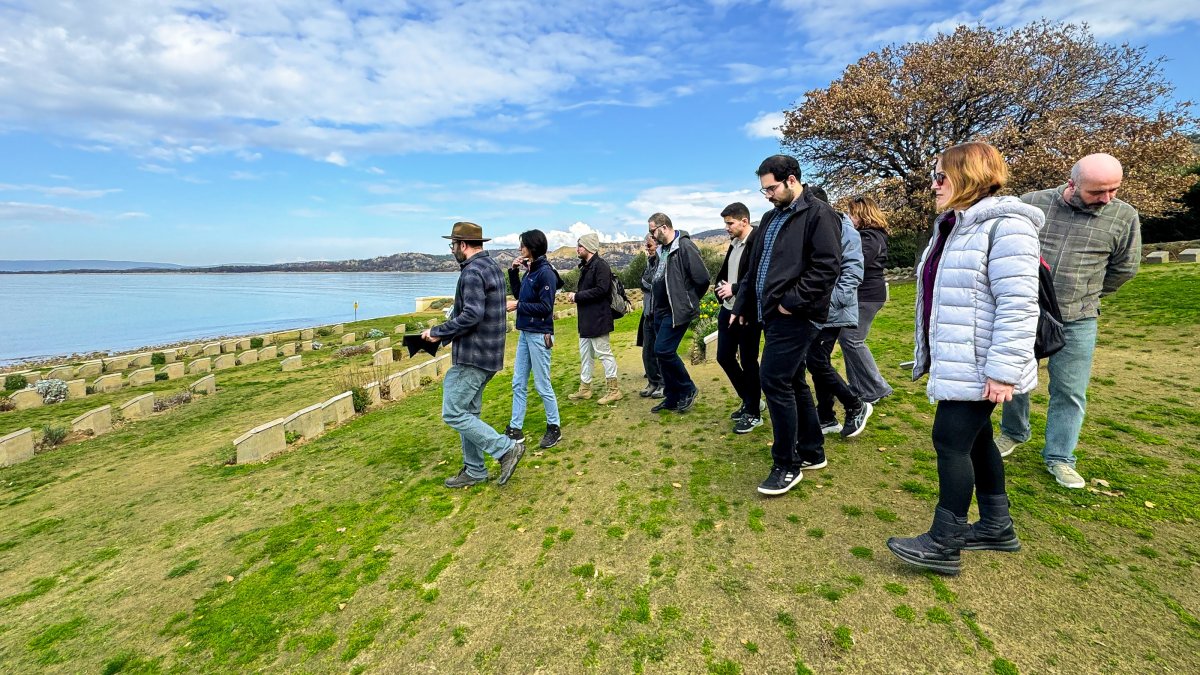Professional tour guides in Türkiye’s Çanakkale are strengthening their knowledge and experience through field training programs held in the Gallipoli Peninsula. The aim is to provide foreign tourists with more qualified guiding services.
The Çanakkale Regional Tourist Guides Association (ÇARO) organized a “3rd Stage English ANZAC Field Training Tour” as part of the 110th anniversary commemorations of the Gallipoli Campaign. This event was designed to enhance the knowledge and competence of local guides.
Under the guidance of Abdurrahim Boz, Chairman of the ÇARO Audit Board, the field training aimed to equip guides with more effective techniques for leading tours. The guides took a ferry across to Kilitbahir, the narrowest point of the Dardanelles Strait, a significant location in the naval battles that the British and French fleets targeted during World War I.
The training also included visiting the Gallipoli Campaign Logistics Center in Kilye Cove, Eceabat, followed by a Gallipoli Epic Promotion Center tour. The guides explored key sites such as ANZAC beachheads, Turkish cemeteries and foreign memorials, along with battle sites like Kanlısırt, Kırmızısırt, Bombasırtı, Kılıçbayırı, Düz Tepe, 261 Rakımlı Tepe, Conkbayırı and Kocaçimen Tepe, all part of the Gallipoli frontline.
As a result of this training, the guides will be able to offer six-hour guided tours for foreign tourists visiting the city for the 110th anniversary of the Gallipoli Campaign, whether in family or group settings.
Boz, a professional tour guide and trainer, shared with Anadolu Agency (AA) that he has been working in the Gallipoli Peninsula since 2007, specializing in the Gallipoli Campaign’s history. He emphasized the significance of such in-service training tours in providing quality services to groups from countries like Australia, New Zealand and the United Kingdom. As part of their professional development, the guides also focused on the terrain and topography of the northern coastline during amphibious landings.
Boz highlighted the preservation of Gallipoli’s battlefield landscapes, with changes mostly confined to plant life. He also noted the importance of memorials such as the Australian Lone Pine Memorial at Kanlısırt and the New Zealand Memorial at Conkbayırı. “Conkbayırı is especially significant to us,” said Boz. “On Aug. 10, we proudly recount the bayonet charge led by Mustafa Kemal Atatürk as part of Turkey’s history as licensed tourist guides.”
Following their tour of Conkbayırı, Boz and the guides concluded their field training at the Topçular Sırtı, where they discussed the evacuation of the Gallipoli Peninsula.
According to Boz, the goal is to encourage foreign visitors to extend their stays beyond the ANZAC tour, offering them a deeper understanding of Gallipoli’s history and encouraging them to visit for multiple nights.
Boz stressed the importance of being a guide in Çanakkale, given the significant historical expectations from guests, particularly Australians, New Zealanders and the British. He added that military units from the U.K. and other countries regularly visit the Gallipoli Peninsula and employ local guides, while the Netherlands Military Academy, as well as military groups from Australia and New Zealand, also make educational visits. “Our aim is to equip our guides with the knowledge they need to provide expert guidance in these areas,” he explained.
Ümmühan Günaydın, a Turkish-Japanese tourist guide who participated in the training for the second time, explained that she uses the winter months for training and reading, as the tourist season is quieter during that period. She emphasized the importance of passing on new information to visitors every year. “For us, the season starts in March and continues intensively until the end of October. We continue with new information every year. That’s why this training is invaluable.”
Hakan Benek, an English-speaking tour guide, expressed his satisfaction with the training, sharing that it was an honor to learn from experienced guides. He also mentioned his goal to expand his language skills to include French, with an aspiration to lead French-speaking tours in the future. “Visitors here often seek to experience history or take academic tours,” he added. “As a guide, we sometimes have to adapt to the needs of the group. I’m just starting out, but I believe I’m doing well, especially in these educational field tours where we can see different ways to engage with visitors.”











